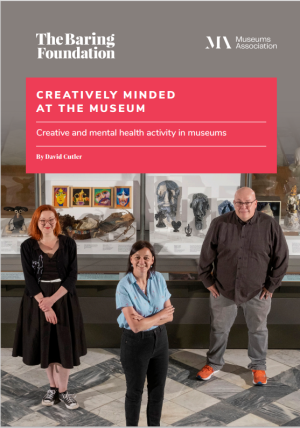We are today publishing a new report, Creatively Minded at the Museum which, through 16 case studies, highlights targeted work by museums to engage people with mental health problems, especially using participatory arts.
The report is part of the Creatively Minded series, which includes Creatively Minded and Heritage by the Restoration Trust, and is supported by the Museums Association.
The 16 case studies in the report include both specialist mental health museums, such as the Mental Health Museum in Wakefield and Glenside in Bristol, and generalist museums, some with renowned collections and others deeply rooted in their community. The examples show the wide range of work that can be undertaken – but highlights the key importance of local mental health partners, including both the NHS and the voluntary sector.
David Cutler, Director of the Baring Foundation and report author, says:
“Museums have displayed a lot of interest in their role in contributing to health and wellbeing. However, when it comes to applying these principles to people living with mental health problems, there has been much less concerted or consistent effort, than for say people living with dementia. This report shows that any museum can undertake this work. We hope that this report will help to inspire more museums to engage in this rewarding area.”
The report’s recommendations, include:
- There needs to be explicated recognition by individual institutions and infrastructure bodies that this is an important area that is currently under-developed.
- Museums should proactively reach out to the local NHS and voluntary sector bodies such as Mind to consider ideas for collaboration.
- Valuing the lived experience and leadership of people with mental health problems, both staff and community members, is essential to developing work in this area.
- Museum funders should make clear the relevance of their funding for this work or offer dedicated funding pots. Wherever possible, this should be long-term funding.
You can download the report here.
You can also hear the curators of these projects talk about their work in our new series of five podcasts, produced by podcaster and mental health advocate, Halina Rifai!
